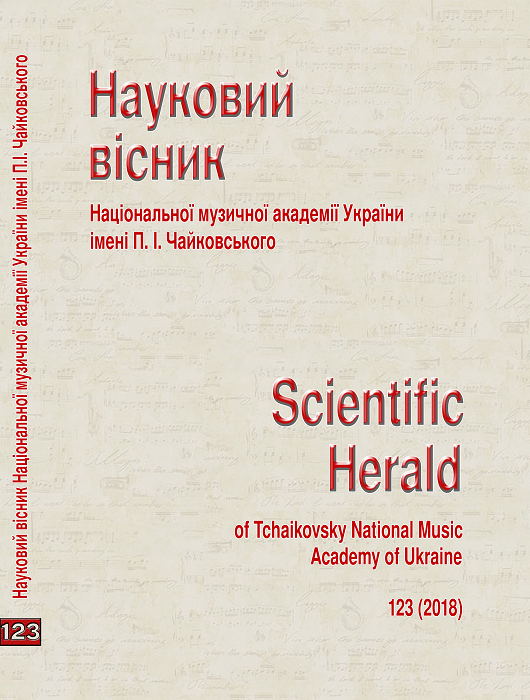The phenomenon of “the death of the Author” in European postmodernspace as a sign of transitionalcultural processes at the end of the 20th century
DOI:
https://doi.org/10.31318/2522-4190.2018.123.152426Keywords:
the phenomenon of “the death of the Author”, post-modernism, minimal music, polystylistics, the turn of the 20th – 21st centuriesAbstract
Relevance of the study. The problem of cultural genesis of postmodern phenomenon of “the death of the Author” has been regarded in the article. The phenomenon has given birth to identical things that independently and simultaneously emerged in literature and music in the second half of the 20th century. There has been little research done on the problem. The phenomenon of “the death of the Author” was initially analyzed and defined by R. Barthes and M. Foucault as that of entirely literary origin. But it also finds its specifically musical embodiment in the composition technique of minimal music and in the phenomenon of polystylistic, discovered by A. Schnittke. These analogies might not be characterized as deliberate extrapolation because of the absence of any apparent artistic interactions and of obvious synchronicity of emergence of the phenomena in question.
The main objective of the study is, having analyzed the principal cultural tendencies at the turn of the 20th – 21st centuries, to prove and to demonstrate the link of literary and musical representations of the phenomenon of “the death of the Author” with large-scale processes of the new understanding of the image of the world and human’s place in the Universe.
Methodology of the study. The search of the general cultural genesis of literary and musical embodiments of the phenomenon of “the death of the Author” was done by intensive use of the hermeneutic method as a tool for the interpretation of artistic (that is, literary and musical) texts as key sense-bearing components of the European culture as a semantic whole. The method of historical analysis also became a necessary research instrument since it made possible retrospective explanation of cultural processes of the second half of the 20th century. The comparative method helped to identify certain literary and musical phenomena as similar things.
Results and conclusions. The hermeneutic, historical and comparative analysis of the phenomenon of “the death of the Author” as an indicator of transitional processes in the European mentality produces paradoxical results: it emphasizes positive semantics of the phenomenon contrary to obviously pessimistic semantics of the term-metaphor itself. The post-modern phenomenon of “the death of the Author” fulfils a special compensatory mission in the art that lies in the shift of the accent from excessive concentration of the artist on his own person to the new understanding of himself as an important, but comparatively humble particle of the gigantic Universe.
Downloads
References
Anohina, S. V. (2009), Polistilistika v muzyikalnoy kulture postmodernizma [Polystylistics in musical culture of post-modernism]: Krasnodar State University of Culture and Arts. Krasnodar, 22 s. [in Russian].
Barthes, R. Smert Avtora [The death of the Author]. Available at: http://www.philology.ru/literature1/barthes-94e.htm (accessed: 31.03.2018) [in Russian].
Zhidkov V. and Sokolov, K. Iskusstvo i sotsiokulturnaya stratifikatsiya obschestva [Arts and social and cultural stratification of society]. Available at: http://www.narcom.ru/ideas/common/65.html (accessed: 16.04.2018) [in Russian].
Lobanova, M. (1990), Muzyikalnyiy stil i zhanr: Istoriya i sovremennost [Musical style and genre: history and modernity]. Moskva: Sovetskiy kompozitor. 222 s. [in Russian].
Lobanova, M. (1994), Zapadnoevropeyskoe muzyikalnoe barokko: problemyi estetiki i poetiki [West European musical baroque: problems of aesthetics and poetics]. Moscow: Musyika. 320 s. [in Russian].
Murashkovskiy Yu. S. Zakonomernosti razvitiya iskusstv [Devellopment patterns of arts]. Available at: https://trizway.com (accessed: 14.04.2018) [in Russian].
Toynbee, A. J. (1996), Postizhenie istorii [A Study of History]. Moscow: Progress. Kultura. 607 s.[in Russian].
Foucault, M. Chto takoe avtor? [What is an author?]. Available at: http://lib.misto.kiev.ua/ (accessed: 27.03.2018) [in Russian].
Schnittke, A. (1994), Polistilisticheskie tendentsii sovremennoy muzyiki [Polystylistic tendencies of modern musik]. In the book: Besedyi s Alfredom Schnittke [Interviews with Alfred Schnittke]. M. : RIK «Kultura». 303 s. S. 143–146. [in Russian].
Spengler, О. (1993), Zakat Evropyi [Decline of Europe]. V. 1. Novosibirsk : Sibirskaya izdat. firma VO «Nauka». 592 s. [in Russian].
Johnson, T. What is minimalism really about? Available at: http://tvonm.editions75.com/articles/1977/what-is-minimalism-really-about.html (accessed: 31.03.2018) [in English].
Schwarz, K. Robert. Steve Reich. Music as a Gradual Process. Part II / Perspectives of New Music, Vol. 20, No.
Downloads
Published
How to Cite
Issue
Section
License
Our journal abides by the CREATIVE COMMONS copyright rights and permissions for open access journals.
Authors, who are published in this journal, agree to the following conditions:
The authors reserve the right to authorship of the work and pass the first publication right of this work to the journal under the terms of a Creative Commons Attribution License, which allows others to freely distribute the published research with the obligatory reference to the authors of the original work and the first publication of the work in this journal.
The authors have the right to conclude separate supplement agreements that relate to non-exclusive work distribution in the form in which it has been published by the journal (for example, to upload the work to the online storage of the journal or publish it as part of a monograph), provided that the reference to the first publication of the work in this journal is included.




